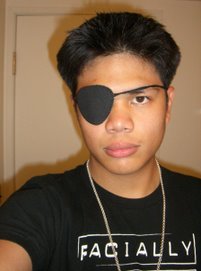
 Put several squares together and fold them up, and you will have a cube. If you were one of the imagined Flatlanders from Edwin A. Abbot's 19th century literary classic Flatland, you would be bound to the Second Dimension and only be able to imagine those several squares to idealize what a cube would look like, but never truly know it until you have experienced it. Our own situation here is trying to understand the concept of the hypercube through the tesseract, an unraveled hypercube, which exists in the fourth dimension, one dimension over us. Like a Flatlander bound to the second dimension, he can only imagine several squares combining to form a cube, but can never truly fathom the cube without experiencing beyond his dimensional prison.
Put several squares together and fold them up, and you will have a cube. If you were one of the imagined Flatlanders from Edwin A. Abbot's 19th century literary classic Flatland, you would be bound to the Second Dimension and only be able to imagine those several squares to idealize what a cube would look like, but never truly know it until you have experienced it. Our own situation here is trying to understand the concept of the hypercube through the tesseract, an unraveled hypercube, which exists in the fourth dimension, one dimension over us. Like a Flatlander bound to the second dimension, he can only imagine several squares combining to form a cube, but can never truly fathom the cube without experiencing beyond his dimensional prison.Keeping with this metaphor and knowing that globalization is an inescapable truth that only becomes harder to deny, we still find ourselves trapped in understanding the world through our default categorizations as we visualize a superficial world through our limited understanding, whether it comes from a lack of information due to the filtering of what is available by hiding it from us, or by what is highlighted for us.
But in spite of all the images on TV, the Internet, magazines, and the accounts of others, we have to remember that this is only a fraction of the other world we have not experienced; like a Flatlander cannot imagine a cube because he only understands the square, we cannot understand this hypercube of reality solely based on the information out there, no matter how much detail we have.
Whether it is an Indonesian nationalist's account of his country's history, or a socialist reporter's understanding of outsourcing in the People's Republic of China and its effect on workers' wages and conditions, there are many truths that are out there they are eager to reveal, but it is their perspectives that create the biases that are evident in their choice of replicating their experiences; from these accounts come a false picture of reality that has some truth in it and is thus only a fraction of what's really out there.
Whether it is Noam Chomsky's conspiracy theories or Tom Plate's chaos theories on popular news media, both cases illustrate the potential for misrepresentation of the world through the media, as well as inherent cultural biases that influence the cultural insensitivity that prevents adequate research and choice of words.
In the case of Noam Chomsky's conspiracy theories, it is believed that the news media deliberately attempts to maintain the status quo as it is influenced by the dollars of the consumers who buy the products from the corporatioons who bombard them with advertisements and control what the media focuses on through corporate sponsorship. In making the real world issues of ongoing genocides or human trafficking less significant by allocating less time to them and more time to sporting events, people are bred to become apathetic machines who consume and consume like animals in a farm. So in this case, it is lack of time given for actual thought as well as limited information which leads to hardly a fragment of the overall picture of reality. The metaphor here is a used-car salesman trying to sell a car for more than it's worth: he cheats the customer by withholding information of better deals or vehicles found elsewhere, and lies about his credibility, achieving the effect of limiting the consumer's choice and making him believe that it is also the best choice.
In the case of Tom Plate's strong case for chaos theory, the news media is definitely influenced by consumer dollars and corporate sponsors, but not to the extent that people are mindless slaves: more specifically, it can simply be explained that it is a matter of stupidity, not sin. From the space restrictions, the rushed editing jobs, lack of sleep from the reporters and editors, as well as differing educational backgrounds and different needs of the audiences, sponsors, and bureaucracy, the real issue is the chaos that arises from an entire organization trying to both earn money and please everyone at the same time, which is a very obvious case that explains why the world is difficult to grasp from the news stories and images that we are fed. The metaphor here is of an office secretary being told to multi-task and accomplish several objectives within a five-minute time frame, from making 200 copies of one document, faxing another one, making a new pot of coffee, answering and connecting an expected phone call to her boss, as well as dealing with any other assignments that come in: this high level of expectation and small time frame is what causes many people to get annoyed when mistakes happen during any of the tasks or if any of them are not completed.
With two proposed reasons for the misinformation fed our way, whichever you choose to believe is one thing, but the important thing to know is that we can not wholly rely on the news media for our world understanding. Thinking critically from the information we receive is one thing, but knowing that there is plenty of information out there to dig through is another thing; the lack of time (or interest for many) prevents us from getting a better perspective that comes from looking through that myriad of information. Suffice to say, we all live on the same planet earth, which is the same shape and size it has been for millions of years, but we all live in our own different worlds, based on different experiences and subjective understandings of what the world is, or whatever it happens to be, if there is any objectivity at all.

